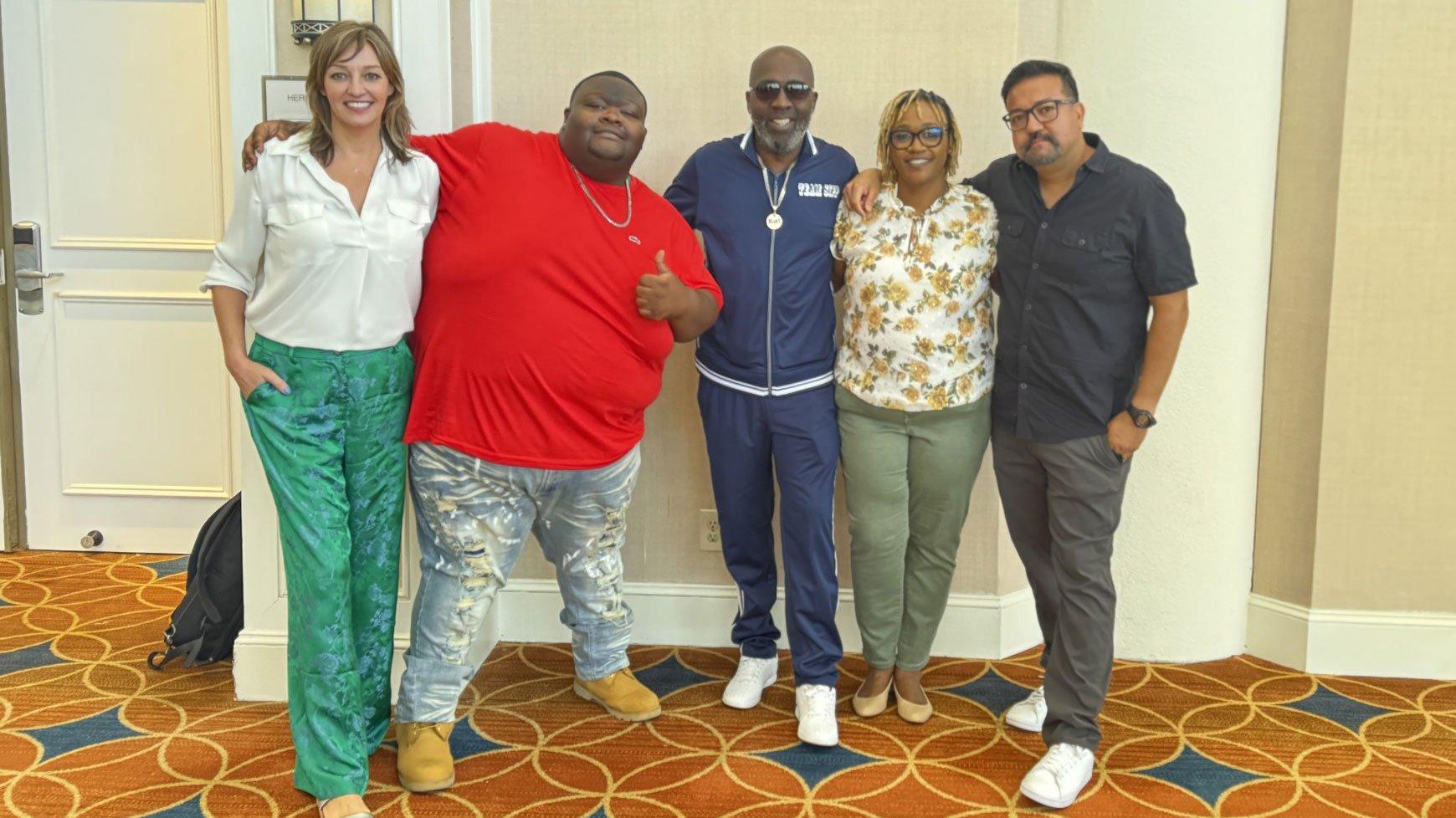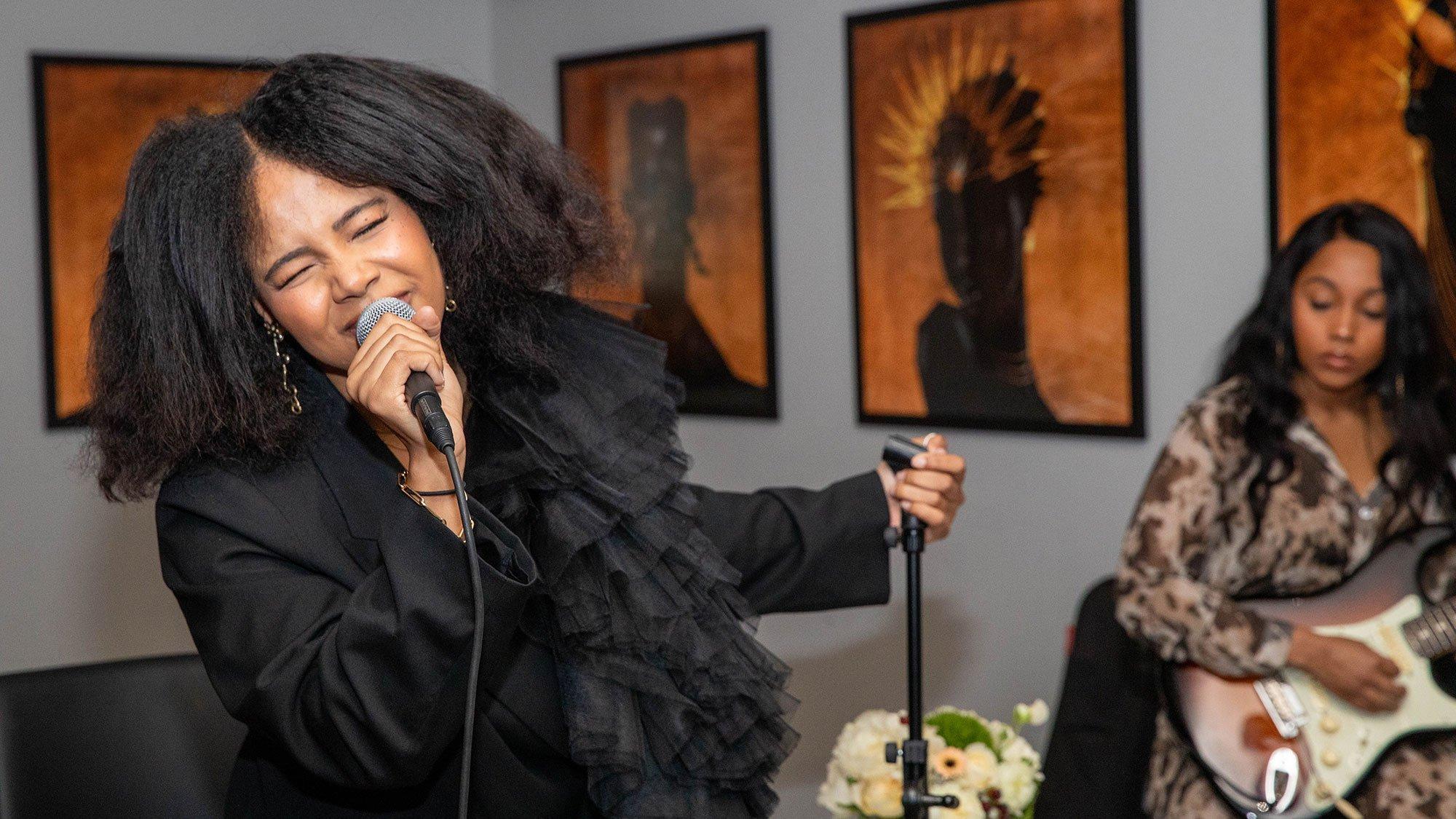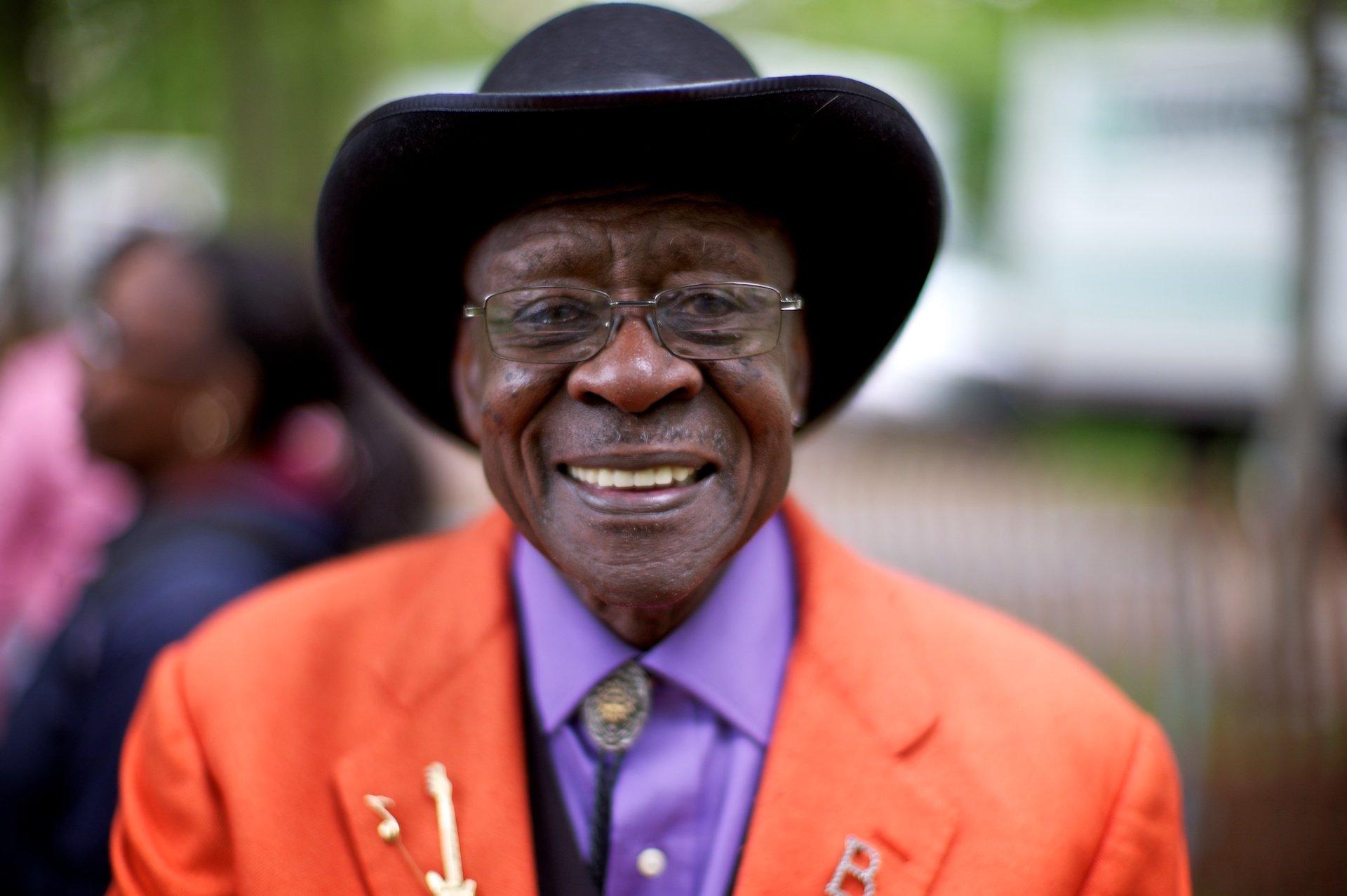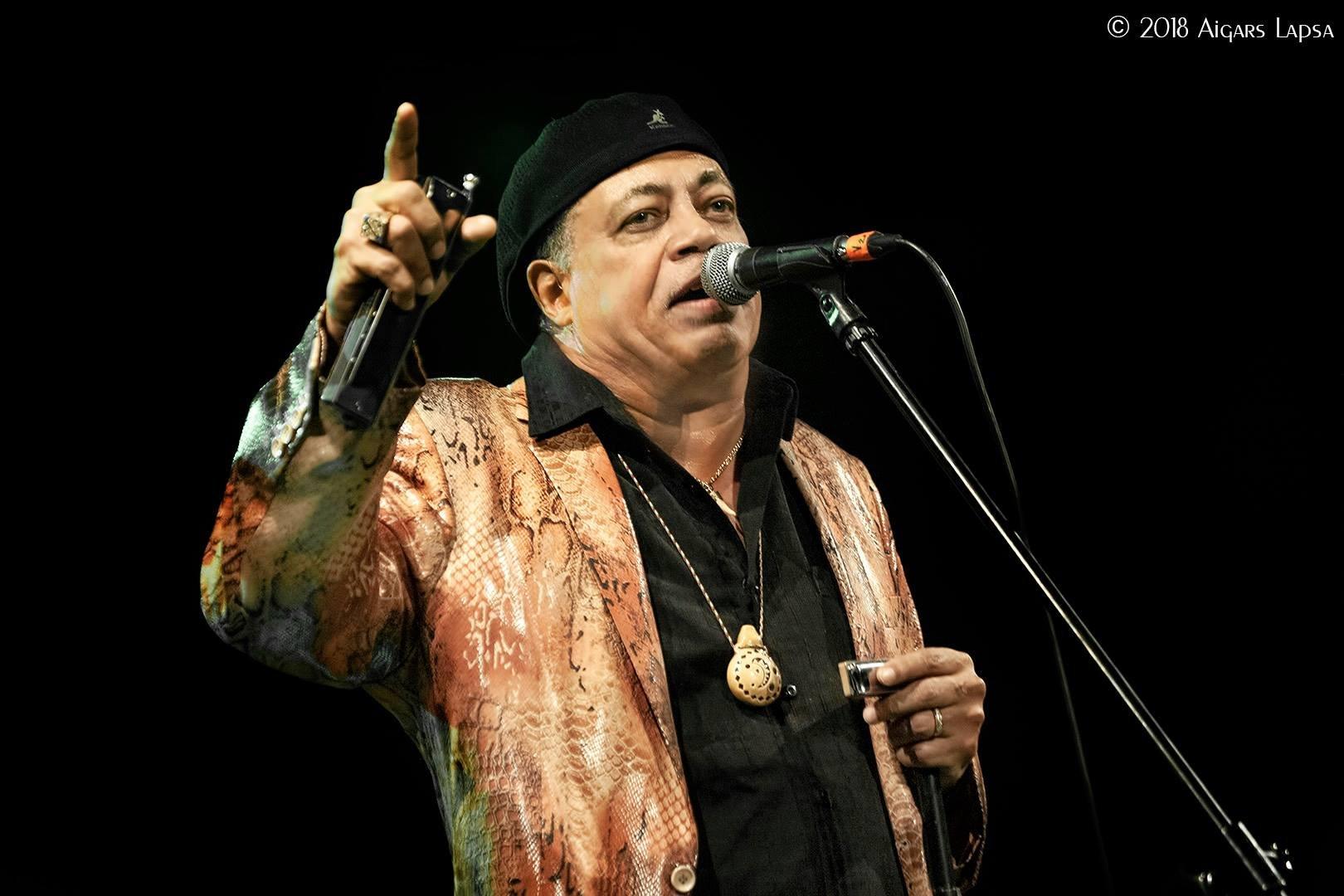Photo: The Recording Academy

list
Key Takeaways From The Recording Academy Roundtable At The 45th Annual Blues Music Awards: From Membership to Submissions
On May 9, the Recording Academy gathered during the Blues Music Awards 2024 to discuss simplifying the GRAMMY membership and submission process for blues artists and the intricacies of requirements and voting.
The second week of May saw music artists from around the world convene in Memphis, Tennessee, for the 45th Annual Blues Music Awards and a host of related events, including the Blues Hall of Fame Induction Ceremony. Amid the excitement, a significant event took place on May 9: a roundtable discussion on Recording Academy membership and the GRAMMY Awards process, sponsored by the Recording Academy in partnership with the Memphis-based Blues Foundation.
The panel, moderated by Blues Foundation President and CEO Kimberly Horton, included GRAMMY-winning blues guitarist Christone “Kingfish” Ingram, GRAMMY-nominated performer Castro “Mr. Sipp” Coleman as well as Recording Academy Membership Manager Shelly Surdoval, and Senior Manager for Awards Ralph Olivarez.
A mixed audience of established and emerging performers including Shemekia Copeland and Danielle Nicole, Memphis Chapter Governor Marcella Simien, and industry veterans like Chicago producer Michael Freeman — a former Governor, Chapter President and National Trustee for the Chicago Chapter and a former Blues Foundation board member — packed a meeting room at the Sheraton Hotel Downtown for the insightful conversation.
The wide-ranging conversation, which also drew in audience members through an extended Q&A session, covered a lot of topics in depth, including membership requirements, perceptions of non-members, the intricacies of voting, and the submission process.
Here are four takeaways from the Recording Academy’s BMAs roundtable discussion:
A GRAMMY Is A Game Changer
For any artist, a GRAMMY nomination or win can mean the difference between music being a fun side hustle and making it a career. That’s especially true in the blues world.
“It definitely boosted me tremendously,” said Ingram about his 2022 GRAMMY for Best Contemporary Blues Album. “After the win, I started playing festivals like Bonnaroo. That’s what we need. We need more blues artists in that space to show that we’re still around."
Coleman, who burst on the scene a decade ago by winning the Blues Foundation’s International Blues Challenge, said he was looking forward to experiencing his own boost following his nomination earlier this year for Best Traditional Blues Album for The Soul Side of Mr. Sipp as well as his participation on a GRAMMY-winning album by the Count Basie Orchestra for which, he learned during the roundtable, he qualified for a participation certificate.
“My schedule for this year was booked before February when the GRAMMY nominations were announced,” said Coleman. “I’m really looking to see the effect of what happened in February next tour season as well as hopefully be landing another nomination.”
GRAMMY Submissions Come With Expert Assistance
“Kim [Horton] helps me with all my submissions,” said Coleman in his introductory remarks, “because I don’t like the little computers and gadgets and stuff.”
Coleman’s comment underscored that — big names like Buddy Guy and Kingfish aside — for most blues artists making music is a cottage industry where if anything gets done it's done by them. That reality makes the paperwork required for awards submissions even more daunting.
Fortunately, the staff at the Recording Academy is here to help. Several times during the panel exchange, Surdoval and Olivarez stressed that if artists had any questions or problems, they just needed to ask.
“We’ve been doing outreach to the blues community for 10-plus years at the Blues Music Awards,” said Sr. Executive Director Jon Hornyak of the Memphis Chapter in his introductory remarks. “We feel like there’s a lot more recordings from the blues community that could be entered in the GRAMMY process. And I think sometimes people think that, well, we’re not going to get a GRAMMY nomination. But every year when you look at the nominations in the blues category there are surprises and there are smaller releases and it’s not always the biggest names.”
The Recording Academy Makes Membership Accessible
Throughout the conversation, it became clear that membership was the first barrier to GRAMMY participation. To be clear, there are some intricacies to proving a prospective member's professional qualifications. But panelists and Recording Academy members in the audience took great care to demystify the process.
That process starts with letters of recommendation from two music industry peers who don’t have to be Academy members. Then applicants need to fill out a professional profile that can include related marketing and press materials; awards and honors; online materials showing a resume of work such as tour dates, music videos, discography, fan interaction, and streaming or sales stats; and proof of professional associations such as managers, publicists, or booking agents.
“I’m sure everyone in this room qualifies as a voting member,” said Larry Batiste, a trustee from the San Francisco Chapter. “It's a peer-to-peer org, so we really need people to be joiners, to be members who really know about the music so that you can vote on what you know. And it's not rocket science to join.”
And, again, if prospective members hit a snag, the panel made it clear they can always reach out for help. Joyce Ann Houston, a St. Louis-based vocalist, trumpeter, and songwriter, who as "Lady J Houston" has played with Albert King among others, found herself in just such a predicament recently.
“I was in the middle of applying, and when I reached out to Shelly for help she had already created my account,” she said. “Now I’m looking forward to being in the class of 2024, hopefully.”
There Are More GRAMMYs For Blues Artists Than Ever
Since the introduction of separate Traditional Blues Album and Contemporary Blues Album categories in 2017, there are more opportunities than ever for blues artists to participate in the GRAMMY process. And they are not just limited to those two new categories.
“We also have track categories that you can submit from your albums,” said Olivarez, who pointed attendees to GRAMMY101.com as an online guide to the complete GRAMMY Awards process. “Blues tracks would qualify in American Roots Performance and American Roots Song. We also have Americana performance [categories] because we understand that albums aren’t just one genre. And we also have craft categories: We have album notes. We have packaging. We have Producer Of The Year. We have engineering. So you can enter in those as well.”
But despite all these avenues for recognition, it was clear from the conversation that not enough artists are taking advantage of them. At one point during the discussion, Horton and Olivarez compared submission numbers; last year the BMAs had 261 total submissions compared to just 102 for the GRAMMYS.
“People just don’t think they can do it. They don’t think they can qualify to do it,” said Horton, who in her role helps a lot of artists navigate the process. “They think they have to be of a certain stature or at a certain place in their career to even submit, and that’s not true.”
Added Coleman, “I just believe that, if you don’t even try, that's a guaranteed way not to succeed.”

Photo: Brian Stukes/Getty Images for The Recording Academy
news
Washington D.C. Chapter Dinner & Conversation Answers "Can We Have Rhythm Without the Blues?"
An intimate private event hosted a discussion led by Recording Academy Washington D.C. Chapter President, Tamara Wellons, and singer/songwriter, Baby Rose to discuss the past, present, and future of the R&B community.
In the serene Capitol Hill neighborhood of Washington D.C., members of the Recording Academy's D.C. Chapter gathered for an exclusive dinner that sparked dynamic discussion and performances, celebrating the unique culture of the R&B community.
In conversation with local creators and artists from the capital region, Recording Academy Washington D.C. Chapter President, Tamara Wellons, and singer/songwriter, Baby Rose, discussed the evening’s primary question, "Can we have rhythm without the blues?"
On Feb. 22, the event unfolded at Bronze, a restaurant inspired by Afrofuturism that merges culinary arts with the culture of the African diaspora. Set in a dimly lit room adorned with gilded artwork, and guests seated at long communal tables, the establishment provided an intimate atmosphere for open and thoughtful dialogue.
In partnership with the Recording Academy's D.C. Chapter and The Black Music Collective, the evening was sponsored by 23andMe, offering a unique opportunity for the community to explore the depths of their heritage and individuality.
Wellons crafted the conversation around the power that R&B has in everyone's life. She shared how this power shapes her own experiences and the ways she lives.
"There’s a place that R&B music is pulled from." Wellons said. She elaborated on how her roles as a mother, wife, and community leader are shaped by her connections to the soul community. "I have to be influential and find the balance," she said.
Born in Washington D.C., Baby Rose, has a profound love for the R&B and soul communities in her hometown. "D.C. is rich in all different types of music — soul just hits differently," said Baby Rose.
"I come from a lineage of strong women," she said to guests. "When it came to finding what I wanted to say, it came from everything I was made to be ashamed of." Finding that power in things that once brought her shame has been an enduring influence on her distinctive sound.
Rose went on to note the impact R&B has had on her music and her roots, both as a woman of color and an artist. “I think (the music) hits different when you tell your story,” she said. “This last record I did in the span of two weeks, and it all poured out of me.”
Between a delicious four course meal and meaningful discussion, Baby Rose performed a stripped version of her new single "One Last Dance," accompanied by Guitarist Ari O’Neal. O’Neal, hailing from Takoma Park, Maryland, also grew up on soul music and used that influence to craft her own genre of R&B. Guests in attendance bore witness to just an ounce of her incredible magic.
As the night continued, conversation centered around more than just the historical impacts of the R&B community and dug deeper into the ways that R&B has helped to transform the mindset of our artists. Guests broke out into small conversation groups and the sense of passion for the DMV community illuminated the room. The topic brought powerful insights, not only on the present, but for the future.
The conversations were impactful, the community was strong, and the consensus confirmed that hope lies within the next generation, but only if the conversation continues.
How R&B Took Over The 2024 GRAMMYs: From Best New Artist Nominees To The GRAMMY Stage

Bob Stroger at the 2011 Chicago Blues Festival
Photo: Jesse Lirola/WireImage
news
Histories: Chicago Blues: Bob Stroger On His 60-Year Journey Singing The Blues
In the latest episode of the Histories: Chicago Blues mini-series, 90-year-old Chicago blues legend Bob Stroger talks about his more than 60 years singing the blues and his days playing in Europe alongside Otis Rush
At 90 years old, Chicago blues electric bassist and singer/songwriter Bob Stroger still loves his job and is ready for more, even decades into his career. After moving from small-town Missouri to Chicago as a teen and seeing Muddy Waters and Howlin' Wolf tear up Silvio's club, he knew he was one day going to become a bluesman, too. While sometimes he got paid and sometimes he got stiffed for gigs, Stroger knew he'd finally made it when fellow blues artist Eddie King got him a show to play for $15.
In the latest episode of Histories: Chicago Blues, a new, limited-run video series presented by the Recording Academy's Chicago Chapter, Stroger talks about his upbringing in the Chicago blues scene, his days playing in Europe alongside Otis Rush, and his favorite part about being a musician: the smiles it provides for listeners.
Histories: Chicago Blues chronicles the story of Chicago blues as told by artists from across three generations of the blues who've helped shape the genre. The series, featuring interviews conducted by GRAMMY-nominated blues artist Kenny "Beedy Eyes" Smith, includes episodes with modern blues artist and Chicago native Melody Angel as well as GRAMMY-nominated Chicago blues harmonica maestro Billy Branch.
For the past 60 years, the Recording Academy's Chicago Chapter has recognized and celebrated the creative accomplishments of our members across the Midwest, fought for their collective rights, and supported them in times of need. We are proud of our legacies and excited to continue looking ahead. Here's to the next 60.
Histories: Chicago Blues: Billy Branch On How The Blues Is A Foundation Of American Music

Billy Branch
Photo Courtesy of Artist
news
Histories: Chicago Blues: Billy Branch On How The Blues Is A Foundation Of American Music
In the newest episode of the informative Histories: Chicago Blues mini-series, GRAMMY-nominated Chicago blues harmonica maestro Billy Branch talks about the need to celebrate the Black creators of the blues as forefathers of American music
Billy Branch was drawn to the blues when he was a kid, when he'd hop on the train at any hour of the day to find and learn from the harmonica players bearing their souls in West Side Chicago. The three-time GRAMMY-nominated blues harmonica maestro has been playing for almost 50 years now, and he's still on a mission to keep the blues alive.
"Please embrace the blues more strongly, because this is where it all came from!" Branch pleads with a smile in the latest episode of Histories: Chicago Blues, a new, limited-run video series presented by the Recording Academy's Chicago Chapter.
Launched this week, with the debut episode featuring modern blues artist and Chicago native Melody Angel, Histories: Chicago Blues chronicles the story of Chicago blues as told by artists from across three generations of the blues who've helped shape the genre. The three-part series, featuring interviews conducted by GRAMMY-nominated blues artist Kenny "Beedy Eyes" Smith, concludes later this week with an episode featuring blues legend Bob Stroger.
In the newest episode of Histories: Chicago Blues, Billy Branch talks about his journey as "a student of the blues," some of the iconic Chicago blues clubs, and the need to celebrate the Black creators of the blues as forefathers of American music.
For the past 60 years, the Recording Academy's Chicago Chapter has recognized and celebrated the creative accomplishments of our members across the Midwest, fought for their collective rights, and supported them in times of need. We are proud of our legacies and excited to continue looking ahead. Here's to the next 60.
